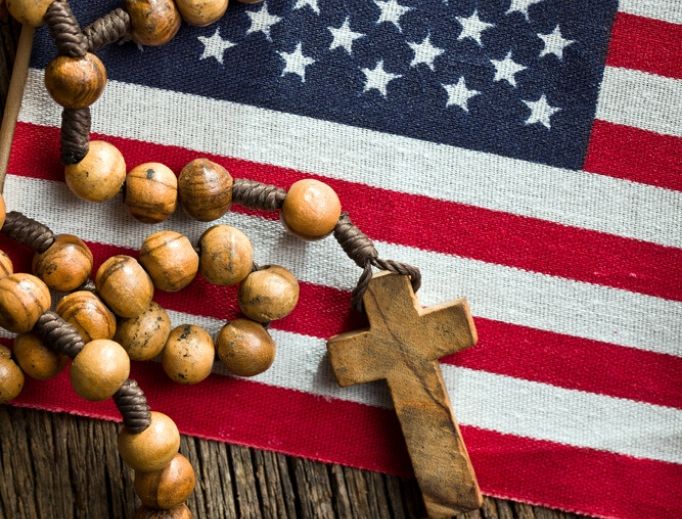First Freedom Prevails: 2 Supreme Court Decisions Draw Clear Line Defending Liberty
A NOTE FROM OUR PUBLISHER

Religious liberty has won the day, at least for now. In two separate 7-2 decisions, the U.S. Supreme Court has affirmed the rights of religious schools to govern themselves and has upheld religious organizations’ legitimate recourse to conscience protections. These are very welcome outcomes that reject persistent efforts by those with a progressive, secular agenda to impose their worldview on people of faith.
While these wins are very important, the battle for religious freedom is far from over.
The Supreme Court decided the case of Our Lady of Guadalupe School v. Morrissey-Berru in favor of two Catholic schools in California, ruling that religious schools can hire and fire teachers because they fall under a so-called “ministerial exception.” The decision also upholds again the principles established by the court in the unanimous 2012 Hosanna Tabor ruling that blocked any government action that “interferes with the internal governance of the church, depriving the church of control over the selection of those who will personify its beliefs.”
At the same time, the high court ruled once more that the government cannot compel the Little Sisters of the Poor — and other religious organizations — to subsidize birth control and abortion-inducing drugs, as was required by the mandate the Health and Human Services (HHS) Department attached to the Affordable Care Act.
Remarkably, this was the second time in four years that the Little Sisters had to seek legal relief. In 2016, the Supreme Court ordered a compromise be worked out, but the Little Sisters had to head back to court over a similar challenge from Pennsylvania and other states. Not only does the favorable ruling in Little Sisters of the Poor v. Pennsylvania protect the sisters from an onerous mandate that would have forced them to violate their consciences or face massive fines, it also affirms the expansive religious and conscience exemptions issued in 2017 by the Trump administration’s HHS Department.
Back in 2012, EWTN was the first lay Catholic organization to wage a legal battle against the so-called contraceptive mandate, and it is worth remembering what was at stake here. Under the provisions of the act, employer-provided health-insurance plans would have been required to cover certain “preventative services,” meaning all contraception methods approved by the Food and Drug Administration, including abortifacient birth control pills, IUDs and sterilization procedures.
In 2018, when EWTN reached a settlement with the Department of Justice and finally won the case at the U.S. Court of Appeals for the 11th Circuit, I wrote, “Almost seven years and two presidential administrations later, the government and the courts have now realized what EWTN has been saying all along, that the HHS mandate was an unconstitutional attempt to coerce us into violating our strongly held beliefs.”
The Little Sisters’ battle has been even longer, but now, thanks to the sisters’ strong stance, the highest court in the land has again, in its July 8 ruling, reaffirmed the protections that are enshrined in our Constitution and the Religious Freedom Restoration Act (RFRA).
“If an employer has a religious objection to the use of a covered contraceptive,” Justices Samuel Alito and Neil Gorsuch wrote in their opinion, “and if the employer has a sincere religious belief that compliance with the mandate makes it complicit in that conduct, then RFRA requires that the belief be honored.” Let’s also remember that none of this should have been necessary. This was noted by Archbishops Thomas Wenski of Miami, chairman of the U.S. Conference of Catholic Bishops’ Committee for Religious Liberty, and Joseph Naumann of Kansas City, Kansas, chairman of the Committee on Pro-Life Activities, in their response to the ruling. “This is a saga that did not need to occur,” they declared. “Contraception is not health care, and the government should never have mandated that employers provide it in the first place. Yet even after it had, there were multiple opportunities for government officials to do the right thing and exempt conscientious objectors. Time after time, administrators and attorneys refused to respect the rights of the Little Sisters of the Poor, and the Catholic faith they exemplify, to operate in accordance with the truth about sex and the human person.”
This is a moment to celebrate that the Supreme Court’s two decisions have drawn a very clear line in defense of religious freedom and the First Amendment. However, “eternal vigilance is the price of liberty.”
I agree with professor Helen Alvaré, who writes here, “Today’s opinions are terrific wins for religious freedom and for the power of the government to protect it. Undoubtedly, however, we will see more cases challenging both the contraception mandate and the authority of religious institutions to have the final word over their personnel and their operations.” Let us be thankful in the present and vigilant in the future, so that the gift of religious freedom can continue to be a gift we can hand on to future generations. God bless you!
















